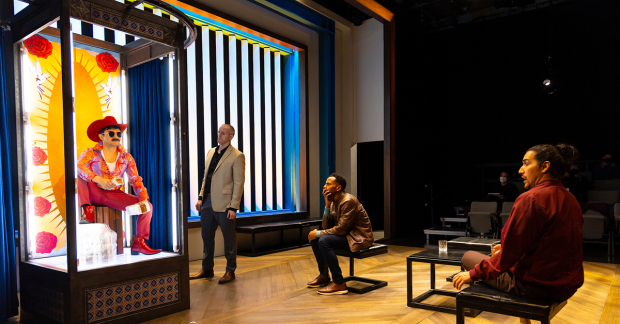REVIEW: A Provocative, Disjointed Living and Breathing at Two River Theater
Mando Alvarado’s new play receives its world premiere in New Jersey.

(© T Charles Erickson)
Nearly thirty years ago, Yasmina Reza debuted her breakthrough play Art, in which the purchase of a stark-white canvas threatens to shatter a tight-knit group of friends. In Living and Breathing, a provocative but disjointed new comedy receiving its world premiere at Two River Theater in Red Bank, New Jersey, writer Mando Alvarado takes this premise a step further. Instead of an abstract piece with an unknowable meaning, how would you react if you found out that your friend bought an installation that features an actual human being?
Alvarado sets off that conundrum when Todd (Michael Markham), a gauche nightclub owner, unveils a "living statue" to his friend Michael (Christopher M. Ramirez), a moderately successful playwright looking to break into television. On a pedestal in Todd's living room—which scenic designer Raul Abrego renders with the right amount of nouveau-riche tackiness—stands Ruben (Carlos Ibarra), whose presence represents the plight of undocumented immigrants in America. We learn that Ruben is part of a series devised by a guerrilla "artivist" designed to combat pervasive stereotypes about minorities; another entry features a Muslim woman wearing a hijab and a suicide-bomber vest.
Ruben comes with customizable costumes that include line cook, migrant worker, and drug lord. (Christopher Vergara designed the tongue-in-cheek outfits, which play on traditionally outlandish media representations.) Todd is quick to confirm that Ruben gets paid a fair hourly wage and only performs in structured twenty-minute shifts. But Michael, who is Mexican American, sees exploitation in Ruben's exhibition, and he enlists their college pal Jeremy (Chris Gardner) to enlighten Todd on the error of his culturally insensitive ways.
Throughout the play's ninety intermissionless minutes, Alvarado weaves together two intersecting plotlines: the persistence of commodification and tokenization in the art world; and the fragile bonds of male friendship. Living and Breathing succeeds most in the former mode, by confronting its audience with an uncomfortable display that we cannot avoid and asking tough questions that might produce troubling answers. Is Ruben a willing participant or a preyed-upon pawn? Is Michael's indignation at Ruben's supposed manipulation a sign of privilege itself? When Jeremy, who is Black and Jewish, reveals that he's moved by the artwork, Michael pointedly questions whether he'd feel differently if it represented an enslaved person or a Holocaust survivor.
The proceedings falter somewhat when the spotlight shines on the trio's relationship. Alvarado offers little to justify their enduring friendship besides attending the same college fifteen years earlier; when they all come together, they seem profoundly incompatible. The individual character writing is rarely grounded in any distinct personality traits, either. We learn a snatch of information here and there about each man—Jeremy wants to become a father, Todd might be living above his means—but these facts become a shorthand for real development. Even as Michael acts as the de facto narrator, he remains largely guarded, his motives obfuscated.
With so little to understand about their shared history, the threat of dissolution feels fairly low stakes. Rebecca Martínez's direction does little to help ratchet up tension, and moments that should seem like major revelations instead land with a thud. Among the central trio, only Ramirez finds a genuinely compelling note to play, as Michael's initial self-righteousness gives way to tentative self-reflection.
The action comes alive when Ibarra descends from his podium and makes Ruben's voice heard. An arresting silent presence before then, Ibarra expresses the full range of conflict housed within the situation. In calling Michael out on his own assumptions and biases, he (and Alvarado) achieve what art is meant to do: question, confront, and disrupt expectations. If only the rest of the play held such a laser focus, Living and Breathing might take your breath away.








